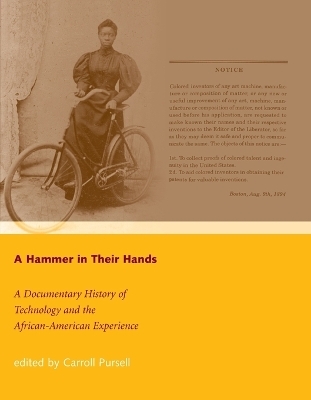
A Hammer in Their Hands
A Documentary History of Technology and the African-American Experience
Seiten
2006
MIT Press (Verlag)
978-0-262-66199-7 (ISBN)
MIT Press (Verlag)
978-0-262-66199-7 (ISBN)
- Lieferbar
- Versandkostenfrei
- Auch auf Rechnung
- Artikel merken
Newspaper and magazine articles, advertisements for runaway slaves, letters, folklore, legal patents, protest pamphlets, and other primary sources document the technological achievements of African-Americans from colonial times to the present.
Scholars working at the intersection of African-American history and the history of technology are redefining the idea of technology to include the work of the skilled artisan and the ingenuity of the self-taught inventor. Although denied access through most of American history to many new technologies and to the privileged education of the engineer, African-Americans have been engaged with a range of technologies, as makers and as users, since the colonial era. A Hammer in Their Hands (the title comes from the famous song about John Henry, "the steel-driving man" who beat the steam drill) collects newspaper and magazine articles, advertisements for runaway slaves, letters, folklore, excerpts from biography and fiction, legal patents, protest pamphlets, and other primary sources to document the technological achievements of African-Americans. Included in this rich and varied collection are a letter from Cotton Mather describing an early method of smallpox inoculation brought from Africa by a slave; selections from Frederick Douglass's autobiography and Uncle Tom's Cabin; the Confederate Patent Act, which barred slaves from holding patents; articles from 1904 by Booker T. Washington and W. E. B. DuBois, debating the issue of industrial education for African-Americans; a 1924 article from Negro World, "Automobiles and Jim Crow Regulations"; a photograph of an all-black World War II combat squadron; and a 1998 presidential executive order on environmental justice. A Hammer in Their Hands and its companion volume of essays, Technology and the African-American Experience (MIT Press, 2004) will be essential references in an emerging area of study.
Scholars working at the intersection of African-American history and the history of technology are redefining the idea of technology to include the work of the skilled artisan and the ingenuity of the self-taught inventor. Although denied access through most of American history to many new technologies and to the privileged education of the engineer, African-Americans have been engaged with a range of technologies, as makers and as users, since the colonial era. A Hammer in Their Hands (the title comes from the famous song about John Henry, "the steel-driving man" who beat the steam drill) collects newspaper and magazine articles, advertisements for runaway slaves, letters, folklore, excerpts from biography and fiction, legal patents, protest pamphlets, and other primary sources to document the technological achievements of African-Americans. Included in this rich and varied collection are a letter from Cotton Mather describing an early method of smallpox inoculation brought from Africa by a slave; selections from Frederick Douglass's autobiography and Uncle Tom's Cabin; the Confederate Patent Act, which barred slaves from holding patents; articles from 1904 by Booker T. Washington and W. E. B. DuBois, debating the issue of industrial education for African-Americans; a 1924 article from Negro World, "Automobiles and Jim Crow Regulations"; a photograph of an all-black World War II combat squadron; and a 1998 presidential executive order on environmental justice. A Hammer in Their Hands and its companion volume of essays, Technology and the African-American Experience (MIT Press, 2004) will be essential references in an emerging area of study.
Carroll Pursell is Adeline Barry Davee Distinguished Professor of History (Emeritus) at Case Western Reserve University and Distinguished Honorary Professor of History at the Australian National University.
| Reihe/Serie | The MIT Press |
|---|---|
| Zusatzinfo | 34 illus.; 34 Illustrations |
| Verlagsort | Cambridge, Mass. |
| Sprache | englisch |
| Maße | 178 x 229 mm |
| Gewicht | 635 g |
| Themenwelt | Geschichte ► Teilgebiete der Geschichte ► Technikgeschichte |
| Sozialwissenschaften ► Soziologie | |
| Technik | |
| ISBN-10 | 0-262-66199-3 / 0262661993 |
| ISBN-13 | 978-0-262-66199-7 / 9780262661997 |
| Zustand | Neuware |
| Haben Sie eine Frage zum Produkt? |
Mehr entdecken
aus dem Bereich
aus dem Bereich
Buch | Softcover (2024)
Lehmanns Media (Verlag)
CHF 27,90
Digitalisierung neu denken für eine gerechte Gesellschaft
Buch | Hardcover (2023)
Quadriga (Verlag)
CHF 27,95
Vom Perceptron zum Deep Learning
Buch | Softcover (2022)
Springer Vieweg (Verlag)
CHF 27,95


